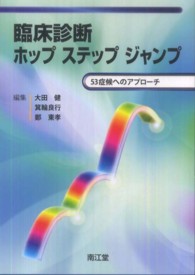Full Description
This volume looks at graduate education, specifically the doctorate, through the lens of adult education practice. Students in doctoral programs are, after all, adults. Building on principles of adult learning, the authors provide examples of academic excellence achieved through the incorporation of best practices in adult education, including: * practical suggestions for democratically negotiating the curriculum, * best practices for nurturing responsible action for social justice, * ways of encouraging collaborative and noncompetitive learning and research, and * support in shifting paradigmatic assumptions beyond the Eurocentric frame. This is the 147th volume of the Jossey Bass series New Directions for Adult and Continuing Education. Noted for its depth of coverage, it explores issues of common interest to instructors, administrators, counselors, and policymakers in a broad range of education settings, such as colleges and universities, extension programs, businesses, libraries, and museums.
Contents
EDITORS NOTES 1 Tom Heaney, Dianne Ramdeholl 1. Democracy Unleashing the Power of We 5 Tom Heaney In this chapter, the author provides rationales as to why doctoral programs should be grounded in democratic paradigms, discussing democratic governance processes and the impact this shift can have on doctoral studies. 2. Critical Reflection as Doctoral Education 15 Stephen D. Brookfield Using a variety of concrete strategies, the author offers a vision of doctoral education grounded in utilizing critical reflection strategies as a way of better understanding power and nurturing individual and collective agency among students. 3. Just the Two of Us ...We Can Make It If We Try: The Relationship Between Social Justice and Doctoral Studies 25 Dianne Ramdeholl Reflecting on her own trajectory from grassroots adult literacy education to academia, the author offers reflections from this journey and outlines some implications for graduate education that are rooted in social/racial justice commitments. 4. Doctoral Studies: What Has Radical Adult Education Got to Do With It? 35 Aziz Choudry, D'esir'ee Rochat A doctoral student and her adviser discuss their experiences as community activists discussing dilemmas and contradictions between the academy and activist learning; they offer possibilities for doctoral education that preserve emancipatory spaces to nurture and sustain central tenets of radical education. 5. A Case for Collaborative Inquiry in Doctoral Education 47 Nadira K. Charaniya, Jane West Walsh The authors, collaborators on a joint doctoral dissertation, reflect on their process and the ways in which this process can subvert dominant notions of knowledge production, instead making space for privileging more collective ways of knowing. 6. Africentrism Standing on Its Own Cultural Ground 59 Derise E. Tolliver Grounding her practice in Africentrism, the author offers a vision of doctoral education that is centered in that worldview and reflects on the challenges and power of a doctoral model rooted in this paradigm. 7. You Gotta Be: Embracing Embodied Knowledges in Doctoral Study 71 Jaye Jones Analyzing the literature on embodied education and implications on positionality within the academy, the author outlines visions for doctoral study that make space for groups who have been historically marginalized/traumatized by academia. 8. Blended Shore Education: Civic Engagement and Competencies in 21st-Century Doctoral Education 81 Gabriele Strohschen Outlining a model of doctoral education that she developed, the author synthesizes important adult education theories along with her own findings, offering a new model for doctoral education. 9. Into the Future, One Second at a Time 93 Tom Heaney, Dianne Ramdeholl In this chapter, the editors briefly synopsize the chapters in this volume, linking them to visions of critical and emancipatory theories/practices of adult education that continue to inform and guide the field. INDEX 97








